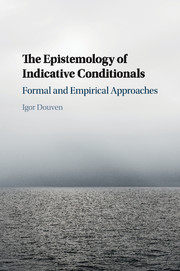6 - Updating
Published online by Cambridge University Press: 05 November 2015
Summary
So far, we have focussed on “static” aspects of the epistemology of conditionals, on various epistemic attitudes that people may have vis-à-vis given conditionals at given points in time, and on the closure conditions for one of those attitudes. But there is an obvious dynamic aspect to that epistemology as well, in that some of the information we receive is of an essentially conditional sort, as when we learn, in our earlier example (on p. 8), that
If Millie is not going to work harder, she will not pass her exam.
or that
If it starts raining this afternoon, the match will be canceled.
Not only do we learn things like these and thereupon come to believe them; such things also tend to impact what else we believe. Learning (6.1) may make me believe that Millie is not as zealous a student as I had thought she was. Equally, learning (6.2) may raise my confidence that if it starts snowing this afternoon, the match will be canceled as well.
What is more, we sometimes have clear intuitions about how one ought to respond to the receipt of conditional information. For example, barring special circumstances, it would seem wrong to lower one's confidence that the match will be canceled if it starts snowing, upon learning (6.2). However, while we seem to routinely process incoming conditional information, the questions of how we process such information and to which normative constraints such processing is subject, have hardly been addressed by epistemologists.
Admittedly, the normative question has been addressed, to some extent, by logicians and computer scientists. But first, they have considered the question almost exclusively from the perspective of AGM theory, which tells at best only a very partial story about belief change. And second, they have mostly sidestepped the issue of whether the resulting account of belief change, as far as it pertains to conditionals, is at least minimally materially adequate in that it does justice to the intuitions we have about how people should respond to the receipt of particular pieces of conditional information.
- Type
- Chapter
- Information
- The Epistemology of Indicative ConditionalsFormal and Empirical Approaches, pp. 150 - 172Publisher: Cambridge University PressPrint publication year: 2015



